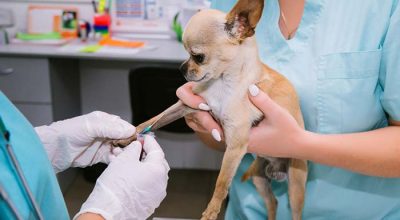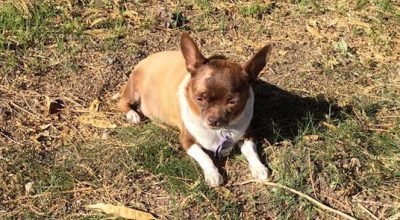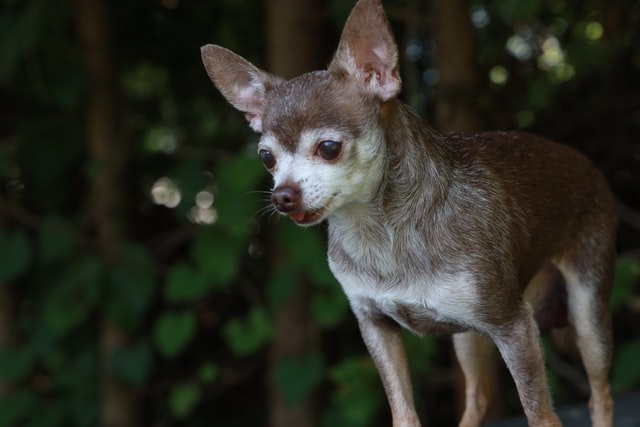
A Chihuahua owner may be shocked when their little dog exhibits aggressiveness against other dogs with such a little pet. Territorial aggression includes barking, nipping, biting, and preparing for a full-fledged physical battle with another dog. However, a Chihuahua with this temperament can be educated to tolerate and, at best, befriend other dogs.
Chihuahuas generally do not get along with other dogs. This is primarily because Chihuahuas may be harsh. Whether or not your Chihuahua will get along with other dogs is determined by how well the Chihuahua has been socialized since puppyhood.
With proper treatment when they are a puppy, constantly socializing them to other dogs and introducing them to different breeds will help them be familiar with it and help them be comfortable hanging out with the dogs around them.
How to Socialize your Chihuahua with Other Dogs
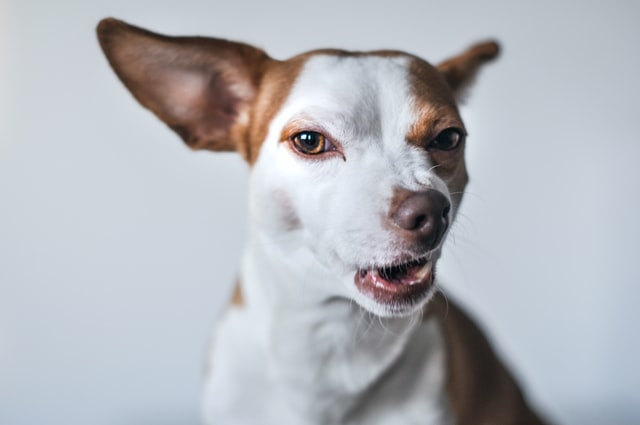
👍Introduce Obedience to them
You want your Chihuahua to be obedient enough to not get into trouble or endanger themselves. What you can do is start your Chihuahua’s obedience training at a young age. This will ensure that you have a well-behaved tiny Chihuahua who you are not scared of when another dog approaches.
👍Double Check if you want to get another Dog
It’s always wonderful to have a new furry family member. But don’t get carried away with enthusiasm. To begin, learn about the possible new member. You may either select a breed compatible with Chihuahuas or adopt a mixed breed from a shelter. Do your homework before deciding on anything.
👍Don’t Overlook your Chihuahua’s Bad Behavior
Many Chihuahua owners undervalue the ‘dog’ element of their little dog. If you believe a Chihuahua is attractive, it’s simpler to let him be violent with other dogs. If this type of behavior toward other canines is not stopped, it may develop into long-term behavioral difficulties. These might injure your Chihuahua if it snaps at a larger dog in a dog park or in your own house.
👍Don’t leave your Chihuahua with a Giant Dog
Some big dogs may be the sweetest fluffballs you’ve ever met. However, they may still pose a threat to your Chihuahua. Whether a dog is tiny or large, they all want to play. Even if your Chihuahua gets along well with a larger dog breed, an incident can occur in seconds. Some larger dogs are unaware that they may injure a smaller dog. This implies they can paw at or jump on your Chihuahua.
When a bigger dog leaps on your Chihuahua, one of the most serious risks is that it will shatter its spine, even if the bite was not malicious, a huge dog’s bite might fracture the Chihuahua’s skull.
👍Physical and Mental Stimulation
When you go out, give your Chihuahua some exercise. Don’t keep them in a bag or cuddle them all the time. Allow children to explore the world on their own two feet. This will be beneficial. Playing fetch, chasing other dogs, and so on can sap your Chihuahua’s vitality. That’s what you’d like to accomplish before exposing your little Chi to a larger dog.
If your Chihuahua hasn’t had enough activity on the walk, they are likely to snap at another dog. They may also begin damaging household furniture or objects.
👍Let your Chihuahua Pick a Dog Friend
Allow your Chihuahua to make their own decision. Both dogs do not need to be best buddies if they do not act aggressively toward another dog. If you’re looking for a dog companion, introduce the two canines on neutral ground and observe how they get along. This should be done with both dogs leashed and the space between them is progressively decreasing.
👍Test the Social Skills of your Chihuahua
Taking your Chihuahua to a dog park is a fantastic way to assess how well it gets along with other dogs. This might be a dog park, a doggie daycare, or a garden where you can socialize with other dog owners. Examine whether your Chihuahua behaves differently to larger canines compared to smaller dogs. For example, allowing your Chihuahua to run near loose dogs that they typically snap at is not a good idea.
Do’s and Don’ts When Walking your Chihuahua
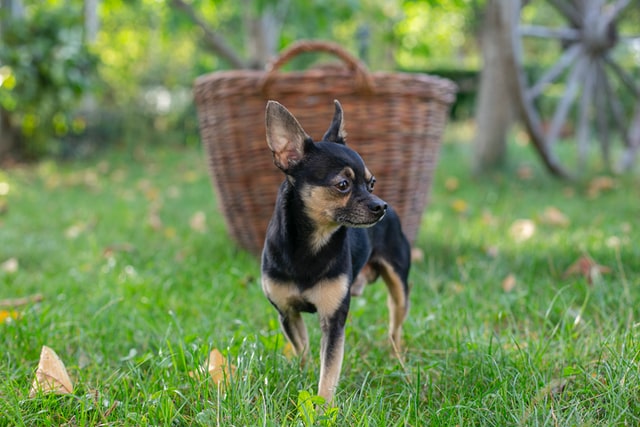
All dog owners recognize the necessity of providing a dog with adequate exercise by walking them regularly, but this requires some socialization, particularly with other dogs.
Do’s
✔️Find a Comfortable Environment
One of the reasons Chihuahuas may become aggressive towards other dogs is boredom; they need to focus their tremendous energy on something, but what that something depends on their environment.
If they are confined to a house with little opportunity to interact with other animals or people, they will turn their energy into hostility. Don’t allow your Chihuahua’s aggressiveness to dictate whether or not you let them out. Isolating a Chihuahua will only make them more aggressive. Know that if you put your Chihuahua in the right setting, they will behave better.
✔️Give them time to Adjust to other Animals
You cannot impose a behavioral change on your Chihuahua; instead, you must give it time and learn about your dog’s nature to counteract their hostility. Setting up doggie play dates is one approach that might assist. In addition, keep your Chihuahua among other dogs, and your dog will gradually get desensitized to the fear and aggressiveness that comes with being around other people’s pets.
If your Chihuahua exhibits signs of hostility toward another dog, keep a careful eye on him and express your control with a firm “No.” If you enable your Chihuahua to socialize regularly, they will have no cause to be provoked by the presence of other dogs on a walk.
✔️Be in Control of the Situation
If you observe your Chihuahua becoming uncomfortable or agitated in the company of another animal, assert your control over them. Do not overreact, and if you can safely separate the animals, do so. Remember that punishing a Chihuahua aggressively for aggressiveness would only make matters worse. Instead, be firm and dominant, and make sure they realize they are misbehaving.
Don’ts
❌Let them Bite
Allowing your Chihuahua to bite your hands during playing increases future violent behavior by teaching your Chihuahua that using teeth on other people or animals is OK. The way a Chihuahua plays can predict how aggressively they would act in public around other dogs.
❌Allow Physical Punishment
You will aggravate the problem if you scare your Chihuahua with physical punishment. Fighting aggressiveness with violence will not result in the correction of behavior. Being forceful is not the same thing as physically hurting your Chihuahua.
Instead of harming or intimidating them, establish your control by verbally expressing your desires and refraining from yelling or striking. Lightly yank on a leash, express yourself quietly, but do not injure your Chihuahua.
❌Lose Control Emotionally
Stay cool if your Chihuahua becomes violent while out on a walk. Your Chihuahua will not regard you as their alpha leader if you seem scared or overreact, and they will believe they have gained authority over you. Maintain your cool in any scenario, and your Chihuahua will respond to you as their protector and leader.
How to Determine Whether Your Chihuahua Is Happy
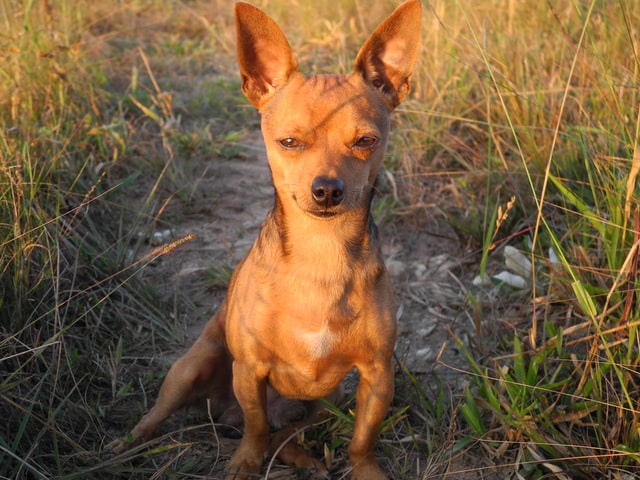
If you’ve been gone for a while and walk back through the door to an excited Chihuahua, that’s an indication your Chihuahua loves you. Aside from the obvious, here are other habits to keep an eye out for.
❕ Smiles
Chihuahuas will frequently relax their mouth, lips, and tongues to offer you a joyful grin. It’s a smile that causes their lips to curve up, their eyes to soften, and their tongue to protrude.
❕ Puppy Dog Eyes
Chihuahuas have some of the most expressive eyes of any dog, and this isn’t simply due to their unusual look. Instead, they may give you the characteristic puppy dog eyes, which indicate a happy Chihuahua, just like any other dog.
Chihuahuas have some of the most expressive eyes of any dog, and this isn’t simply due to their unusual look. They may give you the characteristic puppy dog eyes, which indicate a happy Chihuahua, just like any other dog. As part of their domestic development, dogs appear to have evolved the capacity to melt your heart with a mere look. It’s a reaction behavior since dogs are aware that it elicits a favorable response in people.
Canines who are happy will have relaxed eyes, whereas dogs who are furious or afraid will have narrowed eyes. So, if you see them with those soft Chihuahua eyes, you can be sure yours is content and loves you.
❕ Relaxed Body
Chihuahuas who are loved and happy will be calm, and this will be shown in their physique. A happy Chihuahua will show it with a relaxed physique, including the bum wiggles I described before. You’ll understand what I mean if you’ve ever seen one of those Chihuahua joyful dances when their entire body begins wiggling. A stiff body, on the other hand, is a symptom of tension.
❕ No Destructive Behavior
Unhappy Chihuahuas may be destructive. When they are anxious or depressed, they will gnaw, bite, and destroy anything in their path. This behavior should not be confused with your puppy’s teething time when it is entirely natural for them to chew on objects.
❕ Tongue Out
While there is a disease known as hanging tongue, which neurological and anatomical abnormalities can cause, a little tongue sticking out might indicate contentment. When your Chihuahua is sleeping, you could notice it. The tongue protruding suggests that you are entirely calm and pleased. When your Chihuahua’s tongue sticks out, it might be a sign that they are completely calm, content, and content with life.
❕ Follows you
When you have gained your Chihuahua’s confidence, you will notice that they will follow you around, from room to room, and even if you move on the couch. Chihuahuas enjoy following their owners; it’s one way for a Chihuahua to demonstrate how much it adores you.
❕ Bring you Toys
If your Chihuahua continues to bring you toys, this is a dog’s method of showing you love and affection. It’s their own way of wanting to hang with you while also demonstrating that you’re the pack leader. By giving you their favorite toys, kids are indicating that they trust you with their prized belongings.
If your Chihuahua offers you a toy, it shows they are content and loves you. After all, if they share a toy, it implies that they want you to like and enjoy it as much as they do.
❕ Raised Eyebrows
This isn’t an obvious indicator, but it may be a very subtle method for your Chihuahua to express their affection for you. The study discovered that dogs do not do this with strangers but only with their close people. That means if you go into your living room and your Chihuahua raises an eyebrow at you, they’re sure to be delighted and adore you completely.
❕ Rolling Over
If your Chihuahua lays over in front of you and begs for a belly rub, it’s a clear indicator that they trust and love you, not to mention that they’re in a good mood. Likewise, when a dog turns onto his back and exposes his belly, it implies he trusts you since he is exposing himself. Only safe and happy Chihuahuas will exhibit this type of submissive behavior.
❕ Wiggling Tail
When Chihuahuas are in a good mood, they will wag their tails. You’ll also notice that when they’re joyful, they like to wriggle their buttocks. So if you return home and are welcomed by a shuffling, butt-wiggling canine, you can be certain that your Chihuahua adores you.
Great Appetite
If your Chihuahua is eating well, you can know they’re content. Dogs who lose their appetite, become sluggish, are hesitant to play, and are frequently ill. Your Chihuahua puppy should take three small meals every day, whereas adults should eat twice a day.
❕ Fluffy Fur
A healthy-looking coat is typically an indication that everything is OK with your Chihuahua. When your Chihuahua is in good form, they will appreciate it. A stressed-out Chihuahua, on the other hand, can lose their hair. Flaky skin, visible indications of hair loss, and frequent scratching are all warning indicators. If you see this, your Chihuahua is probably not happy.
❕ Gives you Kisses
Chihuahuas express affection for their owners by pressing their nose and mouth on yours and giving you their version of a kiss. It’s not a lip thing, but rather them pressing their face into yours and performing some rapid-fire sniffing or licking.
❕ Yawns back at you
When you yawn, you’ve probably seen a friend or family member yawn back at you. This is a physiologic reaction caused by the empathy that results in contagious yawns. However, according to recent research, dogs do the same thing. However, they only yawn back at their owners, not outsiders, because it’s all based on empathy. So if you see your Chihuahua yawning when you do, you know they adore you.
❕ Gives a little Sigh
Chihuahuas can produce tiny noises that indicate they adore you or are in a good mood. For example, a contented sigh has been described as a quiet murmur, and it usually occurs when your Chihuahua is settling down to relax. If your Chihuahua performs this in your presence, it shows they are secure and happy with you and are not afraid of any risks.
Stress Symptoms in Your Dog
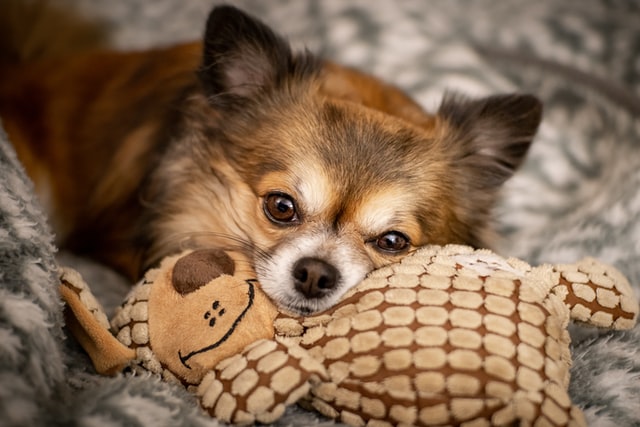
If you have a dog, you know that dogs can communicate their emotions in the same way that humans do. That means that when your puppy is stressed, they may become unhappy and withdrawn, which can develop into depression if left untreated for too long.
❗Constantly Tired
Most depressed dogs will lay around more and will not want to engage with other people in the house. It might be their age, but if it has suddenly appeared or they are sleeping excessively, it could be depression. Try playing with your dog’s favorite toy or taking them for a walk. Fresh air is extremely beneficial to the brain.
❗They Hide
If your pet is depressed, they may hide more. For example, they may be seen napping beneath the bed or in a closet. This is a frequent symptom of sad dogs. If they are disappearing or attempting to retreat in unusual areas in the house, they may be worried or unhappy. Play a game with them or pay more attention to them to help them feel happier and more relaxed.
❗No Energy to Play or go for a Walk
Depressed dogs may suddenly refuse to go on walks. They may not jump up and down when you fetch their leash, race to the door, or react when you ask them to go for a walk. Depressed dogs have a general lack of enthusiasm and enjoyment, which may manifest itself in their unwillingness to go for walks.
❗They do not Eat
Dogs who are sad or anxious may not want to eat or drink. They may also discontinue eating. Any change in appetite can indicate depression, but it can also be an indication of something else. Try taking your dog for a stroll. Take a look at their calorie consumption as well.
❗They can’t stop Licking their Feet
When a dog is sad, they may lick their feet. Many dogs find this to be a soothing technique. Constant licking and grooming indicate that your dog is attempting to soothe himself.
❗They are not interested in hanging with people or other dogs
Dogs adore humans, especially if they are of a breed recognized for being extroverted and friendly. Depressed dogs are typically gloomy and disinterested in life, which may be shown in their reactions to humans. For example, if your Chihuahua refuses to play with their canine pals, they are most likely melancholy. Exuberance is a frequent indicator of dog-to-dog play, and if it is absent, your dog may be depressed.
Frequently Asked Questions
Q: Chihuahuas, are they hostile to other dogs?
A: Some Chihuahuas may be aggressive, particularly towards other dogs, making it difficult to take them on walks and socialize them.
Q: How can I prevent my Chihuahua from being hostile to other dogs?
A: Try to ignore the dogs while they become acquainted. To keep them attentive, maintain them in a ‘sit’ or ‘down’ position.
Q: Is it true that Chihuahuas are more violent than pit bulls?
A: Believe it or not, the dreaded American Pit Bull Terrier is less violent than the small Chihuahua.
Q: Why does my Chihuahua snarl when he sees other dogs?
A: In most situations, your dog’s growl is merely an attempt to communicate.
Q: How intelligent is a Chihuahua?
A: Chihuahuas have poor working and obedience intelligence.
Q: How should I react if my dog barks at my new puppy?
A: Refrain from correcting your dog if he is growling. Growling may be necessary for the puppy to realize that the dog does not want to interact.
Final Thoughts
Small measures must be taken toward socialization. You can’t expect a 4 pound Chihuahua to react appropriately to a 70 pound German Shepard. Set up a gathering in a neutral location so that your Chihuahua does not feel territorial and does not infringe on the territory of another dog. The space between your yard and the yard of a neighbor, or a tiny piece of a quiet park, will work best.
If you want to know more about Chihuahua’s biting aggression situation, click here. Do you want to know more about the breed? Click here.
Was this article helpful? Share your insights in the comment section.
Here at ILoveChihuahua, we share our personal experiences as owners of this feisty breed. We talk about recommended methods, dog supplies picks, and advice on common Chihuahua problems. Our goal is to promote responsible dog ownership, so there would be fewer Chihuahuas in shelters.

